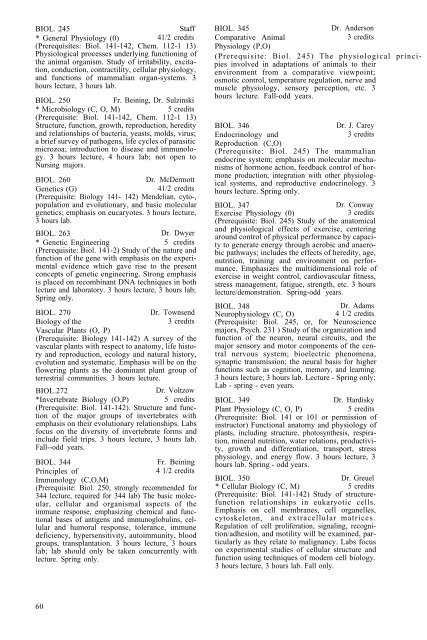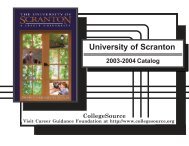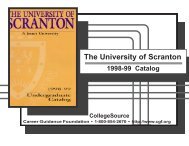Create successful ePaper yourself
Turn your PDF publications into a flip-book with our unique Google optimized e-Paper software.
BIOL. 245 Staff<br />
* General Physiology (0) 41/2 credits<br />
(Prerequisites: Biol. 141-142, Chem. 112-1 13)<br />
Physiological processes underlying functioning <strong>of</strong><br />
the animal organism. Study <strong>of</strong> irritability, excitation,<br />
conduction, contractility, cellular physiology,<br />
and functions <strong>of</strong> mammalian organ-systems. 3<br />
hours lecture, 3 hours lab.<br />
BIOL. 250 Fr. Beining, Dr. Sulzinski<br />
* Microbiology (C, O, M) 5 credits<br />
(Prerequisite: Biol. 141-142, Chem. 112-1 13)<br />
Structure, function, growth, reproduction, heredity<br />
and relationships <strong>of</strong> bacteria, yeasts, molds, virus;<br />
a brief survey <strong>of</strong> pathogens, life cycles <strong>of</strong> parasitic<br />
microzoa; introduction to disease and immunology.<br />
3 hours lecture, 4 hours lab; not open to<br />
Nursing majors.<br />
BIOL. 260 Dr. McDermott<br />
Genetics (G) 41/2 credits<br />
(Prerequisite: Biology 141- 142) Mendelian, cyto-,<br />
population and evolutionary, and basic molecular<br />
genetics; emphasis on eucaryotes. 3 hours lecture,<br />
3 hours lab.<br />
BIOL. 263 Dr. Dwyer<br />
* Genetic Engineering 5 credits<br />
(Prerequisite: Biol. 141-2) Study <strong>of</strong> the nature and<br />
function <strong>of</strong> the gene with emphasis on the experimental<br />
evidence which gave rise to the present<br />
concepts <strong>of</strong> genetic engineering. Strong emphasis<br />
is placed on recombinant DNA techniques in both<br />
lecture and laboratory. 3 hours lecture, 3 hours lab;<br />
Spring only.<br />
BIOL. 270 Dr. Townsend<br />
Biology <strong>of</strong> the 3 credits<br />
Vascular Plants (O, P)<br />
(Prerequisite: Biology 141-142) A survey <strong>of</strong> the<br />
vascular plants with respect to anatomy, life history<br />
and reproduction, ecology and natural history,<br />
evolution and systematic. Emphasis will be on the<br />
flowering plants as the dominant plant group <strong>of</strong><br />
terrestrial communities. 3 hours lecture.<br />
BIOL.272 Dr. Voltzow<br />
*Invertebrate Biology (O,P) 5 credits<br />
(Prerequisite: Biol. 141-142). Structure and function<br />
<strong>of</strong> the major groups <strong>of</strong> invertebrates with<br />
emphasis on their evolutionary relationships. Labs<br />
focus on the diversity <strong>of</strong> invertebrate forms and<br />
include field trips. 3 hours lecture, 3 hours lab.<br />
Fall--odd years.<br />
BIOL. 344 Fr. Beining<br />
Principles <strong>of</strong> 4 1/2 credits<br />
Immunology (C,O,M)<br />
(Prerequisite: Biol. 250, strongly recommended for<br />
344 lecture, required for 344 lab) <strong>The</strong> basic molecular,<br />
cellular and organismal aspects <strong>of</strong> the<br />
immune response, emphasizing chemical and functional<br />
bases <strong>of</strong> antigens and immunoglobulins, cellular<br />
and humoral response, tolerance, immune<br />
deficiency, hypersensitivity, autoimmunity, blood<br />
groups, transplantation. 3 hours lecture, 3 hours<br />
lab; lab should only be taken concurrently with<br />
lecture. Spring only.<br />
60<br />
BIOL. 345 Dr. Anderson<br />
Comparative Animal 3 credits<br />
Physiology (P,O)<br />
(Prerequisite: Biol. 245) <strong>The</strong> physiological princi-<br />
pies involved in adaptations <strong>of</strong> animals to their<br />
environment from a comparative viewpoint;<br />
osmotic control, temperature regulation, nerve and<br />
muscle physiology, sensory perception, etc. 3<br />
hours lecture. Fall-odd years.<br />
BIOL. 346 Dr. J. Carey<br />
Endocrinology and 3 credits<br />
Reproduction (C,O)<br />
(Prerequisite: Biol. 245) <strong>The</strong> mammalian<br />
endocrine system; emphasis on molecular mechanisms<br />
<strong>of</strong> hormone action, feedback control <strong>of</strong> hormone<br />
production, integration with other physiological<br />
systems, and reproductive endocrinology. 3<br />
hours lecture. Spring only.<br />
BIOL. 347 Dr. Conway<br />
Exercise Physiology (0) 3 credits<br />
(Prerequisite: Biol. 245) Study <strong>of</strong> the anatomical<br />
and physiological effects <strong>of</strong> exercise, centering<br />
around control <strong>of</strong> physical performance by capacity<br />
to generate energy through aerobic and anaerobic<br />
pathways; includes the effects <strong>of</strong> heredity, age,<br />
nutrition, training and environment on performance.<br />
Emphasizes the multidimensional role <strong>of</strong><br />
exercise in weight control, cardiovascular fitness,<br />
stress management, fatigue, strength, etc. 3 hours<br />
lecture/demonstration. Spring-odd years.<br />
BIOL. 348 Dr. Adams<br />
Neurophysiology (C, O) 4 1/2 credits<br />
(Prerequisite: Biol. 245, or, for Neuroscience<br />
majors, Psych. 231 ) Study <strong>of</strong> the organization and<br />
function <strong>of</strong> the neuron, neural circuits, and the<br />
major sensory and motor components <strong>of</strong> the central<br />
nervous system; bioelectric phenomena,<br />
synaptic transmission; the neural basis for higher<br />
functions such as cognition, memory, and learning.<br />
3 hours lecture; 3 hours lab. Lecture - Spring only;<br />
Lab - spring - even years.<br />
BIOL. 349 Dr. Hardisky<br />
Plant Physiology (C, O, P) 5 credits<br />
(Prerequisite: Biol. 141 or 101 or permission <strong>of</strong><br />
instructor) Functional anatomy and physiology <strong>of</strong><br />
plants, including structure, photosynthesis, respiration,<br />
mineral nutrition, water relations, productivity,<br />
growth and differentiation, transport, stress<br />
physiology, and energy flow. 3 hours lecture, 3<br />
hours lab. Spring - odd years.<br />
BIOL. 350 Dr. Greuel<br />
* Cellular Biology (C, M) 5 credits<br />
(Prerequisite: Biol. 141-142) Study <strong>of</strong> structurefunction<br />
relationships in eukaryotic cells.<br />
Emphasis on cell membranes, cell organelles,<br />
cytoskeleton, and extracellular matrices.<br />
Regulation <strong>of</strong> cell proliferation, signaling, recognition/adhesion,<br />
and motility will be examined, particularly<br />
as they relate to malignancy. Labs focus<br />
on experimental studies <strong>of</strong> cellular structure and<br />
function using techniques <strong>of</strong> modem cell biology.<br />
3 hours lecture, 3 hours lab. Fall only.
















